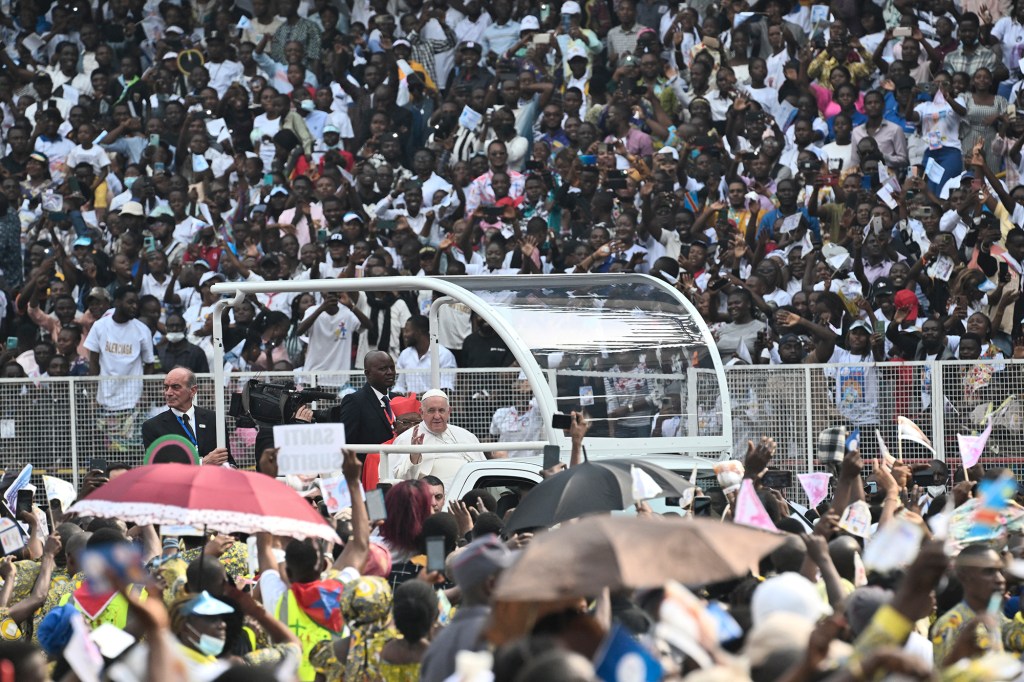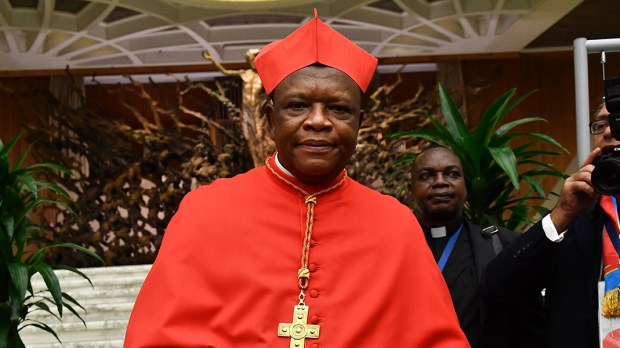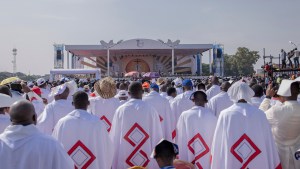The question of educating young people must be a priority for the Church in Africa, but also for the universal Church: This is the position defended by Cardinal Fridolin Ambongo, archbishop of Kinshasa (DRC) and close collaborator of Pope Francis. To embody it, he accompanied a delegation from the “International Foundation Religions and Societies” (“Fondation internationale Religions et Sociétés“), to present the Pope with the African Educational Pact.
This document aims to help dioceses take actions in favor of an improved education. I.MEDIA interviewed him at a presentation of the Pact organized in Rome by the Belgian Embassy to the Holy See.
The African Education Pact is inspired by the Global Compact on Education (2020) promoted by Pope Francis, and was launched at the Symposium of Episcopal Conferences of Africa and Madagascar (SECAM) in Kinshasa in 2022. How can this African Education Pact respond to what you describe as an “education crisis in Africa”?
Cardinal Ambongo: We’re very proud and grateful to the Holy Father for this brilliant idea of a Global Compact on Education. Last year in Kinshasa, we held a symposium in which we reflected on this global pact in the African context. The African Educational Pact is the result of this meeting. In this pact, we have taken into account the diversity of situations in Africa. However, we have also noted points of convergence. The main thing we have in common is that we are all trying to put the human being at the heart of education. If we are driven by the concern to train our children so that tomorrow they become men and women worthy of this world, it’s obvious that we find ourselves in agreement.
What are your expectations of the Pope?
Cardinal Ambongo: We expect him to encourage us on the path we’ve already taken. But not just us in Africa, because education is global. We also need him, as supreme head of the universal Church, to build awareness in the other Churches, because if we do things at home in Africa, and there are no repercussions in the other Churches, it won’t have much impact. For example, immigration from our part of the world is provoked by the signals sent out by the West, which make young people believe that the West is paradise. Once they arrive here, they discover that this is not the case, and sometimes, that it is even hell. So we think that the sister Churches in the West should be able to follow the same logic, so that we can send the same message to our young people and to young people all over the world.
What role can the African Church play in promoting a more “integral” education, more in tune with territorial and cultural realities, as promoted by Pope Francis?
Cardinal Ambongo: We need to return to the starting point: Why do we educate? To do this, we need to draw on African culture. In Africa, education for life took place through what we called initiation. Adolescents were taken into the forest, where they were taught the art of living in a given society. Then when they came back, after six months or a year, they were ready to enter adult life. Today, schools have replaced places of initiation. Unfortunately, our young people, when they finish school today, are not at all prepared to face the challenges of life. This is why we say that our education system does not correspond to the needs of our society.
If we go back to basics, we need to start from life’s needs, the challenges facing young people, the professions they need to prepare for, and move forward on that basis. So that once you’ve finished your studies, you’re useful to society. But that’s not the case here today. The love for diplomas means that people are often prepared to pay a lot to pass classes, but in the end, when they’re confronted with the needs of society, they shine through for their incompetence. Because they haven’t been prepared. On this point, we think the Church can play a role, by making society aware of this problem and helping to train young people for the needs that arise, not just to be able to go to university.
An important question for African education is the relationship between Church and state. What do you expect from politicians in terms of education?
Cardinal Ambongo: There are clearly things that the Church in Africa expects from the state, because it remains the organizing power in education. To do this, it must also make resources available to the Church. The Church comes with know-how, with motivation, with its vocation to educate, but it’s up to the State to provide the means.
In some African countries, the budget devoted to education is substantial. But in others, it sometimes represents barely a third of the budget used to run the presidency. That’s why we think we need to get back to the basics. First and foremost, there is the child, created in the image and likeness of God. He is a human being who is called to grow, to become a man in the full sense of the word. If we start from this common point, in Africa we already have a common denominator for education. But when education becomes a business source, when schools are created to make money, then we’re missing the real point.
You denounce the poison of corruption eating away at your country’s educational system. Last February 2, in the large Martyrs of Pentecost stadium, Pope Francis made a memorable appeal on this point. Do you think his message has been heard?
Cardinal Ambongo: I think the Pope set the tone in Kinshasa. We were all there, all the bishops of the Congo, in a stadium of over 100,000 young people who responded to the Holy Father’s provocations as one person! He carried our values high. When the Pope said: “No to corruption,” the whole crowd chanted in response: “No to corruption, no to tribalism,” no to anti-values! I think the Pope has put his pact on values into practice.
For us, it was a source of motivation and encouragement. And we’re continuing to reflect on the follow-up to what the Pope had to say – in particular on the image of the “five fingers” he used, each finger representing a value. The young people have clearly understood his message.

Do you sense a concern from the Pope towards young people, and young Africans in particular?
Cardinal Ambongo: This is a constant concern of Pope Francis. Before becoming Pope, he was a pastor. A pastor is someone who is in constant contact with young people, who knows the difficulties and problems they face. Once elected, he maintained this contact with young people. It was remarkable when he came to us: The day he met our young people, he was unrecognizable, rejuvenated and re-energized. He was clapping his hands, stirring up the young people. It was an extraordinary moment. I think that’s one of his charisms: He really has a passion for young people.
Another educational challenge for the Church in Africa is the formation of young seminarians and novices. For example, your country has more than 4,000 seminarians. What are the challenges facing them, and religious formators in the DRC?
Cardinal Ambongo: Here again, we have to be careful about the lack of basic education, which should prepare young men and women to carry values. We feel this in the seminaries and novitiates: It shows the urgent need to better prepare our young people in our society. For us, it’s very important to work on the quality of the training we give tomorrow’s priests. If we’re not careful, we run the risk of ending up with only priests who have undergone training to gain social status, but who understand nothing of the vocation of a true priest.


